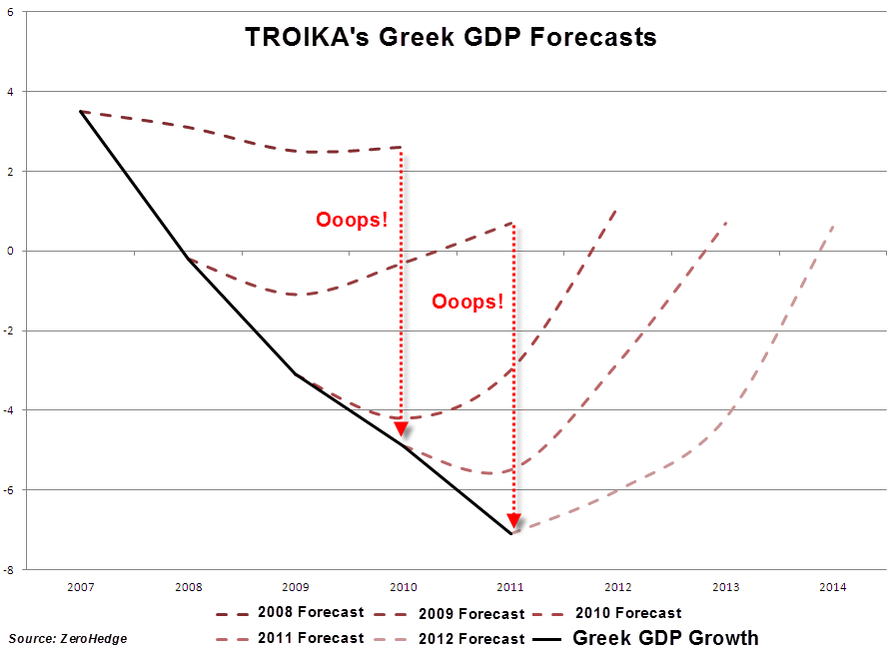Good read on Greece - Interfluidity
http://www.interfluidity.com/v2/5965.htmlGreece is a remarkable country full of wonderful people, but along dimensions of development and governance, the place is plainly pretty fucked up. It has been fucked up that way for a long time, for decades at least. This has never been secret. Anyone who has visited Athens knows it has far more in common with Bucharest or Istanbul than with orderly Western European capitals. In the run up to Greece’s joining the Euro, everyone who wanted to know knew that Greece’s qualifications to join the Eurozone were, shall we say, ambitious. Mainstream establishment banks “helped” Greece and other Southern European countries with accounting fudges that, while perhaps obscure, were not secret even at the time. Despite protestations when these deals hit the news in 2010 that officials were “shocked, shocked”, they were explicitly blessed by the agency that compiles the statistics on which Eurozone entrance was based in 2002 and Greece’s gaming was extensively reported in 2003 (ht Heidi Moore, both cites). The Euro was and ought to be primarily a political enterprise. In order to sell the common currency to Northern European elites, its architects required Eurozone members to meet strict “convergence criteria” and especially the requirements of the Stability and Growth Pact. But in practice, those criteria have always been interpreted flexibly. Most Eurozone members have broken their promises at one point or another, including both Germany and France. The Euro was a unification project, and erred (not unreasonably, I think) on the side of building a big tent.
Germany and France may have missed their Stability and Growth commitments now and again, but they are not fucked up like Greece is. Greek governments — not the current, much maligned Syriza, but decades of its predecessors — treated the state like a teat from which clients and friends of electoral victors might suck. The Greek state has been a shady, opportunistic borrower, no doubt, the kind of character no one would lend money to with any great expectation of seeing it back.
And yet, that’s precisely what bankers in the relatively not-fucked-up Eurozone countries did! These people were not naïfs. They knew the Greek state was sketchy. But precisely because it was sketchy, prior to the financial crisis its debt paid slightly higher interest rates than that of safer Eurozone sovereigns. European banking regulations attached zero risk weights to all EU sovereigns, rendering it nearly costless for banks to simply manufacture deposits to purchase sovereign debt. Eurozone sovereigns were default-risk-free as a regulatory matter and currency-risk-free from the perspective of Eurozone banks. The European financial system was architected to make lending to Greece — and Spain and Portugal and Italy — a money machine for bankers with little career risk over a medium term. Sketchy credits tend to punch above their weight in terms of volume of issuance, so there was a lot of nice paper to buy. The bankers who lent to these states understood perfectly well that there was in fact a long-term risk, an uncertainty, a constructive ambiguity. They lent anyway, and took home very nice salaries and bonuses for doing so. It was conventional to lend, the mainstream consensus was that credit risk was over and worry warts were old-fashioned, Europe was strong and would work this out. If the worry warts turned out to be right, it was likely years away, IBGYBG.
azmom
(5,208 posts)Class people of Greece. I'm hoping they vote no, tomorrow.
FlatBaroque
(3,160 posts)
malthaussen
(17,219 posts)Or that they care about the long term. It may have once been true -- I've been reading William Sherman's memoirs recently, and he was a very conscientious banker before he became a raging lunatic general -- but it hasn't been true for years, now. (And even in WT's time, there were plenty of shady practices)
The naivete here is that of people who think that a profession dedicated to feathering its own nest is also smart enough (or cares enough) not to kill the goose that lays the golden eggs (forgive the mixed metaphor, I must be inspired by your avatar). That hasn't been true for a long time now, either. The motto now is to get what you can while the getting is good, and if the world crashes around you, make sure you're on the first plane out.
-- Mal